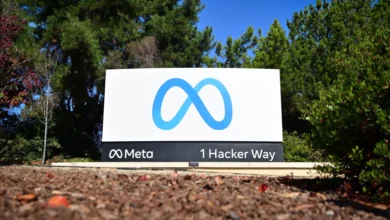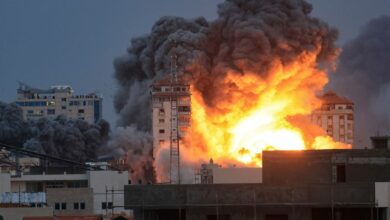Sharm el-Sheikh–Despite a relatively open internet environment in Egypt, censorship is enacted in a variety of forms, say advocates of freedom of expression. Such limitations in Egypt and elsewhere have prompted international initiatives to work on documentation and advocacy.
Speaking about online censorship at the fourth Internet Governance Forum held in Egypt, Sami Ben Gharbia, director of advocacy for Global Voices Online, reminded his audience of the case of Egyptian blogger Mosaad Abu Fajr.
Abu Fajr, a 41-year-old man from north Sinai, has been jailed for almost two years for writing about the marginalization and lack of resources among the Bedouin of Sinai. “[H]e has been calling for support to the people of Sinai, where Sharm el-Sheikh is located. The people of Sinai are marginalized, with no access to the wealth of the ghettos of tourists where we are,” Ben Gharbia said to attendees at the conference organized by the United Nations and hosted by Egypt.
The conference, which included talks about internet openness, security, and access, among other topics, also had a space for discussion of censorship in the presence of state delegations.
The case of Abu Fajr was mentioned in the context of Threatened Voices, a project undertaken by Global Voices Online, which is a community of bloggers bringing the world local stories by citizen journalists that are not found in traditional and mainstream media. Threatened Voices maps the arrests, detention and sentencing of bloggers around the world who are persecuted for their online activity. It is one of a few documentation initiatives that addresses continuing state scrutiny over the internet, which takes a variety of forms in different countries.
“It’s like crowd-sourcing information about threatened voices worldwide. This can help mainstream organizations like Committee to Protect Journalists, Amnesty International and Human Rights Watch in their work," Ben Gharbia said. "It is difficult to find accurate information online. By aggregating this information in a central hub, we think we’re providing helpful information about bloggers to human rights defenders.”
The aggregated information is laid out in the form of a map, which also gives a geographic dimension to the occurrence and intensity of bloggers’ intimidation. At the time this story was published, the map had 28 cases of intimidation, arrest and detention of bloggers in Egypt.
In another initiative, Robert Guerra, Internet Freedom project director with Freedom House, a US-based non-governmental organization, spoke about their work tracking and studying threats to free expression online.
Earlier this year, Freedom House published a report called "Freedom on the Net: a Global Assessment of Internet and Digital Media." According to Guerra, the report offered an original methodology to measure freedom of expression online. Freedom House based its methodology on three main indicators: obstacles to access, which include control over internet infrastructure and service providers; control on content, which includes website blocking and self-censorship; and violations of users’ rights, which include intimidation and arrest. A final score is given to surveyed countries. A score of zero represents the best online freedom environment and a score of 100 is the worst.
Egypt scored 45 in the study, which was published in May 2009. This translates into “partly free,” according to the initiative’s indicators.
“The governments of Egypt, Malaysia and Russia encourage expanded access to the Internet and impose relatively little censorship, but they monitor Internet activity quite extensively and impose harsh penalties on their online critics,” said Guerra.
The report also detailed different forms of censorship that include technical filtering of websites, keywords and manual posts-removal; blocking applications and technologies such as Web 2.0 applications; content manipulation by governments-financed commentators; technical attacks through hacking; legal and extra-legal interventions such as censorship laws and security intimidation; and outsourcing of censorship to third parties.
The two last censorship mechanisms are found in Egypt. “In repressive environments such as Egypt, …outsourcing involves extensive surveillance and user registration, particularly in cyber-cafes,” said Guerra. “Egypt stands out as a country with a relatively open internet environment that resorts to harassment to make an example of a few prominent activists and bloggers.”
Franck La Rue, UN special rapporteur on the promotion and protection of the right to freedom of opinion and expression, said that there is more to free expression online than not arresting bloggers.
“We do not need to speak only about the passive responsibility of the state to not intervene and to not regulate,” he said. “States have a proactive responsibility that goes beyond not censoring and not putting barriers. They need to increase accessibility, to generate accessibility to populations beyond racial, religious, cultural and especially economic barriers.”
The Internet Governance Form witnessed an incident of censorship, which grabbed some media attention, when UN security requested an event organizer to remove their poster from the door of the room where their presentation was held. The OpenNet Initiative, which advocates online freedom of expression, organized a presentation about its forthcoming publication titled Access Controlled: The Shaping of Power, Rights, and Rule in Cyberspace, which analyzes internet filtering practices worldwide. The poster of the presentation featured a statement that referred to China’s “famous Great Firewall”, the first national internet filtering system.
When the UN and the IGF secretariat received criticism, Markus Kummer, IGF’s executive coordinator, maintained that the UN cannot be portrayed as stifling freedom of expression. “The UN has to abide by certain rules. One of the founding principles of the UN is respect of national sovereignty and territorial integrity,” said Kummer, at a press conference. “When we were about to start the orientation session, the delegation of China wanted to see me and they pointed to the flyer posted by the organizer, which referred to a book that was the subject of the session. The Chinese delegation objected [to the poster]. So we asked the organizers to withdraw that flyer.”
While Kummer considered the incident minor, it made headlines, one of which, read, “anti-internet censorship conference is censored.”




